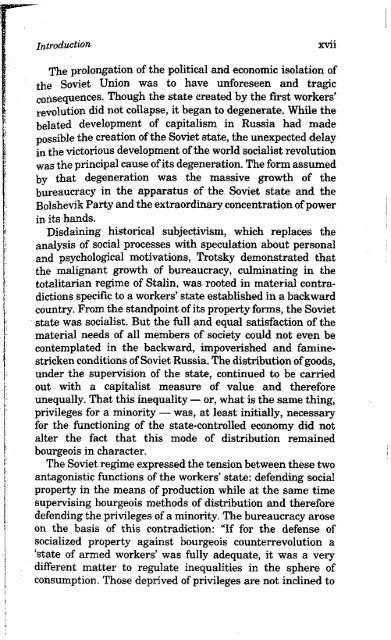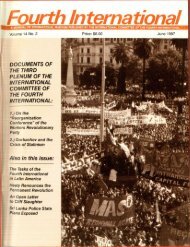- Page 3: The Revolution Betrayed
- Page 6 and 7: Originally published in 1937 © 199
- Page 9 and 10: Contents Introduction ix Author's I
- Page 11 and 12: Introduction In the annals of polit
- Page 13 and 14: Introduction xi society whose chara
- Page 15 and 16: Introduction xi society whose chara
- Page 17 and 18: Introduction xiii machinations of t
- Page 19: Introduction xv Just as internation
- Page 23 and 24: Introduction xix forces — permitt
- Page 25 and 26: Introduction xxi country, his decla
- Page 27 and 28: Introduction xxiii Opposition in th
- Page 29 and 30: Introduction XXV the Second Interna
- Page 31 and 32: Introduction xxvii cally substantia
- Page 33 and 34: Introduction xxix The turn by the U
- Page 35 and 36: Introduction xxxi piece of soothsay
- Page 37 and 38: Introduction xxxiii The Revolution
- Page 39 and 40: Introduction XXXV imperialism and t
- Page 41 and 42: Introduction xxxvii downfall depend
- Page 43 and 44: Introduction xxxvn downfall depende
- Page 45 and 46: Introduction xxxix victorious revol
- Page 47 and 48: Introduction xii of housing, workin
- Page 49 and 50: Introduction xliii incapable of bec
- Page 51 and 52: Introduction xiv Involution and the
- Page 53 and 54: Introduction xlvii Stalinists' expr
- Page 55 and 56: Introduction xlix of an informal be
- Page 57 and 58: Introduction li jng West Germany),
- Page 59 and 60: Introduction liii admiration for th
- Page 61: Introduction lv tion of Marxism by
- Page 64 and 65: 2 Author's Introduction The writing
- Page 66 and 67: 4 Author's Introduction with it. We
- Page 68 and 69: 6 What Has Been Achieve consequentl
- Page 70 and 71:
8 What Has Been Achieved firmly hop
- Page 72 and 73:
10 What Has Been Achiei The struggl
- Page 74 and 75:
12 What Has Been Achieved speckled
- Page 76 and 77:
14 What Has Been Achiei blast furna
- Page 78 and 79:
16 What Has Been Achieved States, t
- Page 81 and 82:
CHAPTER TWO Economic Development an
- Page 83 and 84:
fl/ar Communism, NEP and the Course
- Page 85 and 86:
War Communism, NEP and the Course t
- Page 87 and 88:
yjar Communism, NEP and the Course
- Page 89 and 90:
Communism, NEP and the Course towar
- Page 91 and 92:
4 Sharp Turn 29 aiitry was denounce
- Page 93 and 94:
A Sharp Turn 31 empirics now decide
- Page 95 and 96:
^ Sharp Tarn ain only "islands in a
- Page 97 and 98:
n 35 ASharp1u 48 million poods, tha
- Page 99 and 100:
A Sharp Turn tries w a s there an a
- Page 101 and 102:
CHAPTER THREE Socialism and the Sta
- Page 103 and 104:
f he Transitional Regime 41 fllarx
- Page 105 and 106:
Program and Reality 43 only a dying
- Page 107 and 108:
fhe Dual Character of the Workers'
- Page 109 and 110:
fhe Dual Character of the Workers'
- Page 111 and 112:
"Generalized Want" and the Gendarme
- Page 113 and 114:
The "Complete Triumph of Socialism"
- Page 115 and 116:
fhe "Complete Triumph of Socialism"
- Page 117:
The "Complete Triumph of Socialism"
- Page 120 and 121:
58 The Struggle for Productivity of
- Page 122 and 123:
60 The Struggle for Productivity of
- Page 124 and 125:
62 The Struggle for Productivity of
- Page 126 and 127:
64 The Struggle for Productivity of
- Page 128 and 129:
66 The Struggle for Productivity of
- Page 130 and 131:
68 The Struggle for Productivity of
- Page 132 and 133:
70 The Struggle for Productivity of
- Page 134 and 135:
72 The Struggle for Productivity of
- Page 137 and 138:
CHAPTER FIVE The Soviet Thermidor W
- Page 139 and 140:
Why Stalin Triumphed 77 the head of
- Page 141 and 142:
Why Stalin Triumphed 79 the install
- Page 143 and 144:
Why Stalin Triumphed 79 the install
- Page 145 and 146:
fhe Degeneration of the Bolshevik P
- Page 147 and 148:
fhe Degeneration of the Bolshevik P
- Page 149 and 150:
The Degeneration of the Bolshevik P
- Page 151 and 152:
The Degeneration of the Bolshevik P
- Page 153 and 154:
fhe Degeneration of the Bolshevik P
- Page 155 and 156:
fhe Social Roots of Thermidor 91 Th
- Page 157 and 158:
fhe Social Roots of Thermidor 93 gu
- Page 159 and 160:
fhe Social Roots of Thermidor 95 co
- Page 161 and 162:
The Social Roots of Thermidor 97 co
- Page 163 and 164:
CHAPTER SIX The Growth of Inequalit
- Page 165 and 166:
Want, Luxury and Speculation 101 In
- Page 167 and 168:
Want, Luxury and Speculation 103 ar
- Page 169 and 170:
The Differentiation of the Proletar
- Page 171 and 172:
fhe Differentiation of the Proletar
- Page 173 and 174:
The Differentiation of the Proletar
- Page 175 and 176:
Social Contradictions in the Collec
- Page 177 and 178:
Social Contradictions in the Collec
- Page 179 and 180:
The Social Physiognomy of the Rulin
- Page 181 and 182:
The Social Physiognomy of the Rulin
- Page 183 and 184:
The Social Physiognomy of the Rulin
- Page 185 and 186:
The Social Physiognomy of the Rulin
- Page 187 and 188:
CHAPTER SEVEN Family, Youth and Cul
- Page 189 and 190:
Thermidor in the Family 125 shamefa
- Page 191 and 192:
Thermidor in the Family 127 who can
- Page 193 and 194:
Thermidor in the Family 129 These g
- Page 195 and 196:
Thermidor in the Family 131 iron ec
- Page 197 and 198:
Thermidor in the Family 133 mere st
- Page 199 and 200:
The Struggle against the Youth 135
- Page 201 and 202:
The Struggle against the Youth 137
- Page 203 and 204:
The Struggle against the Youth 139
- Page 205 and 206:
The Struggle against the Youth 141
- Page 207 and 208:
The Struggle against the Youth 143
- Page 209 and 210:
Nationality and Culture 145 The cul
- Page 211 and 212:
Nationality and Culture 147 If we l
- Page 213 and 214:
Nationality and Culture 149 it has
- Page 215 and 216:
Nationality and Culture 151 that, d
- Page 217 and 218:
Nationality and Culture 153 ing dep
- Page 219 and 220:
Nationality and Culture 155 his rea
- Page 221:
Nationality and Culture 157 creativ
- Page 224 and 225:
160 Foreign Policy and the Army tus
- Page 226 and 227:
162 Foreign Policy and the Army In
- Page 228 and 229:
164 Foreign Policy and the Army far
- Page 230 and 231:
166 Foreign Policy and the Army Sov
- Page 232 and 233:
168 Foreign Policy and the Army to
- Page 234 and 235:
170 Foreign Policy and the Army mor
- Page 236 and 237:
172 Foreign Policy and the Army ary
- Page 238 and 239:
174 Foreign Policy and the Army imp
- Page 240 and 241:
176 Foreign Policy and the Army stu
- Page 242 and 243:
178 Foreign Policy and the Army Wes
- Page 244 and 245:
180 Foreign Policy and the Army cir
- Page 246 and 247:
182 Foreign Policy and the Army cul
- Page 248 and 249:
184 Foreign Policy and the Army con
- Page 250 and 251:
186 Foreign Policy and the Army bou
- Page 252 and 253:
188 Foreign Policy and the Army cha
- Page 254 and 255:
190 Foreign Policy and the Army the
- Page 256 and 257:
192 Foreign Policy and the Army Sov
- Page 258 and 259:
194 Foreign Policy and the Army Dip
- Page 260 and 261:
196 Foreign Policy and the Army was
- Page 262 and 263:
198 Foreign Policy and the Army esp
- Page 264 and 265:
200 What Is the USSR? peasants and
- Page 266 and 267:
202 What Is the USSR? Soviet state
- Page 268 and 269:
204 What Is the USSR? homeless cons
- Page 270 and 271:
206 What Is the USSR? collective fa
- Page 272 and 273:
208 What Is the USSR? grow indefini
- Page 274 and 275:
210 What Is the USSR? which, given
- Page 276 and 277:
212 What Is the USSR? dominion in t
- Page 278 and 279:
214 What Is the USSR? of the prolet
- Page 280 and 281:
216 What Is the USSR? us back to th
- Page 283 and 284:
CHAPTER TEN The USSR in the Mirror
- Page 285 and 286:
Work "According to One's Abilities"
- Page 287 and 288:
The Soviets and Democracy 223 To be
- Page 289 and 290:
The Soviets and Democracy 225 hundr
- Page 291 and 292:
Democracy and the Party 227 with po
- Page 293 and 294:
Democracy and the Party 229 In tryi
- Page 295 and 296:
Democracy and the Party 231 nonpart
- Page 297 and 298:
CHAPTER ELEVEN Whither the Soviet U
- Page 299 and 300:
Bonapartism as a Regime of Crisis 2
- Page 301 and 302:
Bonapartism as a Regime of Crisis 2
- Page 303 and 304:
The Struggle of the Bureaucracy wit
- Page 305 and 306:
The Struggle of the Bureaucracy wit
- Page 307 and 308:
The Inevitability of a New Revoluti
- Page 309 and 310:
The Inevitability of a New Revoluti
- Page 311:
The Inevitability of a New Revoluti
- Page 314 and 315:
250 Appendix suggested to Stalin, i
- Page 316 and 317:
252 Appendix remains a long histori
- Page 318 and 319:
254 Appendix tortoise tempo had fal
- Page 320 and 321:
256 Appendix The spokesman at the c
- Page 322 and 323:
258 Appendix "friends," preferring
- Page 324 and 325:
260 Appendix bureaucracy, receiving
- Page 326 and 327:
262 Appendix who yearn for the past
- Page 329 and 330:
Notes Chapter One. What Has Been Ac
- Page 331 and 332:
Notes 267 bureaucracy through the A
- Page 333 and 334:
Notes 269 counterrevolution" (Probl
- Page 335:
Notes 271 governments came to power
- Page 338 and 339:
274 Biographical & Historical Gloss
- Page 340 and 341:
276 Biographical & Historical Gloss
- Page 342 and 343:
278 Biographical & Historical Gloss
- Page 344 and 345:
280 Biographical & Historical Gloss
- Page 346 and 347:
282 Biographical & Historical Gloss
- Page 348 and 349:
284 Biographical & Historical Gloss
- Page 350 and 351:
286 Biographical & Historical Gloss
- Page 352 and 353:
288 Biographical & Historical Gloss
- Page 354 and 355:
290 Biographical & Historical Gloss
- Page 356 and 357:
292 Biographical & Historical Gloss
- Page 358 and 359:
294 Biographical & Historical Gloss
- Page 360 and 361:
296 Biographical & Historical Gloss
- Page 362 and 363:
298 Biographical & Historical Gloss
- Page 364 and 365:
300 Biographical & Historical Gloss
- Page 366 and 367:
302 Biographical & Historical Gloss
- Page 368 and 369:
304 Biographical & Historical Gloss
- Page 370 and 371:
306 Biographical & Historical Gloss
- Page 372 and 373:
308 Biographical & Historical Gloss
- Page 374 and 375:
310 Biographical & Historical Gloss
- Page 376 and 377:
312 Biographical & Historical Gloss
- Page 378 and 379:
314 Index Executive Committee; Demo
- Page 380 and 381:
316 Index Education, 40, 131, 137,1
- Page 382 and 383:
318 Index ists, 64,84,155,223-24,25
- Page 384 and 385:
320 Index Property, personal, 221-2
- Page 386:
322 Index White guards, 140-41, 239





